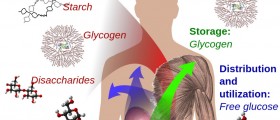
Insulin resistance is a serious and complex condition that gradually develops over many years. It is characterized by lessening the efficiency of the natural hormone insulin, which is involved in regulation of carbohydrate and fat metabolism in the body. As a result, blood levels of glucose may grow behind their normal boundaries, and provoke numerous health problems. Insulin resistance triggers many bodily processes, putting the pancreas under additional pressure to secrete more insulin. However, if the pancreas fails to produce enough insulin to compensate the loss in its efficiency, type 2 diabetes will occur. This metabolic disorder is characterized by high blood glucose.
Signs and symptoms of insulin resistance
Insulin resistance is a very much misunderstood health problem. Most of the people believe that only overweight people and those eating too much sugar suffer from insulin resistance. However, this disease affects all groups of people even though it can be prevented. Signs and symptoms of insulin resistance may vary depending on the individual biology. Here are some of the most prominent of them.
People with insulin resistance will typically have elevated blood sugar levels. Their first symptoms may include excessive fatigue, brain fogginess and problems with concentration. These patients may feel extremely sleepy after meals and have problems with digestion. People with insulin resistance are typically overweight and have a lot of difficulties losing weight. Their triglyceride levels will be increased, as well as the blood pressure. In most of the cases, patients will experience increased hunger, brown patches of skin in the body folds, and possibly depression.
Causes of insulin resistance
Insulin resistance is a complex disorder caused by many overlapping factors. According to certain studies, dietary habits may play an important role in development of this disease. After the digestion of animal protein, very high levels of protein cortisol are found in the bloodstream. This protein is associated with development of insulin resistance. Moreover, animal proteins cause blood pH to become acidic, which may also cause insulin resistance. Insulin resistance is sometimes caused by excessive and long-term intake of fatty foods along with the vitamin D deficiency.
Sometimes, the causes of insulin resistance are more delicate, at a molecular or cellular level. Insulin resistance can therefore result from excessive circulating insulin, by means of down-regulation of insulin receptors. On the molecular level, it may be caused by a reaction to excess nutrition by superoxide dismutase in cell mitochondria.
Insulin resistance is also associated with some other diseases, such as polycystic ovary syndrome. It is also found that people who had some type of a weight loss surgery, have increased insulin sensitivity.

















Your thoughts on this
Loading...